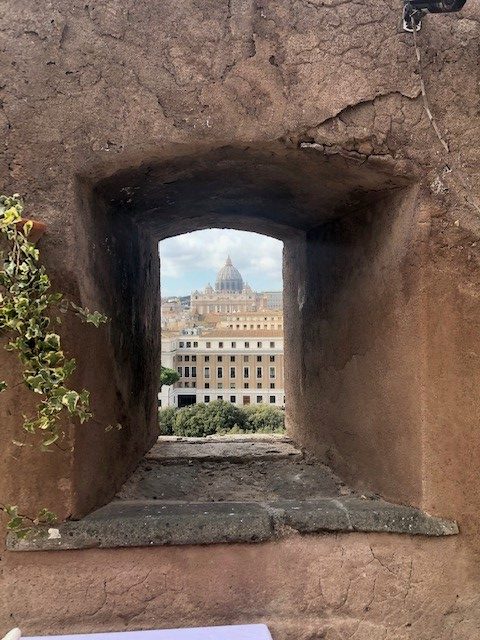
Read: Isaiah 40:25-31
Have you not known? Have you not heard? The LORD is the everlasting God, the Creator of the ends of the earth. He does not faint or grow weary; his understanding is unsearchable (Isaiah 40:28, NRSV).
They call it “compassion fatigue.” Even if you can’t come up with a ready definition for the phrase, you may be all too familiar with the phenomenon. It’s not just that you are tired. It’s that you are exhausted—emotionally and physically—from the sight of so much suffering.
I thought of compassion fatigue this week when my friend, Dorothee Mack, posted a picture of the flooded streets below her apartment in Milan. “Go to sleep in Milan…wake up in Venice!” she wrote. Is it not enough that over 31,000 people have died from COVID-19 in that region of Italy; now they have to deal with floods?! The irony is that this storm will probably not even make the news in most places. And even if it does, people may not have the emotional energy to give it much thought.
Why is that? Is it because we are callous? Are we selfish or cruel or indifferent to the suffering of others? Maybe. Or maybe we simply have a bad case of compassion fatigue.
It’s not as if the pandemic is our only problem. Flooded streets in Milan are just the tip of the ice-berg. Oh, that’s right—the ice-bergs are melting because of climate change. Racism is ever with us, leaving its unwelcome calling card in the form of way too many black and brown bodies. Did I mention hate speech, poverty, and domestic violence? Political poison with some sexism on the side?
I find myself wistful for the time when the world was not so much “with us.” In an article about the negative impact of incessant media exposure, Psychology Today observed that “we can fathom the suffering of a few, but a million becomes a statistic that numbs us” (see below).
Even before the advent of media overload, 19th century novelist George Eliot put her finger on something close to compassion fatigue when she wrote about the overwhelming nature of even “ordinary” human suffering:
“That element of tragedy which lies in the very fact of frequency, has not yet wrought itself into the coarse emotion of mankind; and perhaps our frames could hardly bear much of it. If we had a keen vision and feeling of all ordinary human life, it would be like hearing the grass grow and the squirrel’s heart beat, and we should die of that roar which lies on the other side of silence.” (Middlemarch, Part 2, chapter 20)
If what she wrote is true of everyday suffering en masse, how much more are we likely to be overwhelmed by tragedy on a global scale?
If we are to avoid being crushed by the weight of the world’s grief, we will need to take refuge in the One who “does not faint or grow weary” (Is. 49:28). As the Creator, God’s credentials are clear. The One who created the universe is strong enough to handle this. While we may feel like our personal suffering goes unnoticed, God’s “understanding is unsearchable” (vv. 27-28). God sees, God hears, and God cares. Yet God is not overwhelmed by that “that roar which lies on the other side of silence.”
So, hear this good news in the midst of your grief, your anxiety, and your compassion fatigue: there is a place you can find rest. It is in the shelter of the One who is strong enough to bear the full weight of the world’s suffering. It is in the company of the One who is—even now—working to end that suffering. It is in the promise of the One who whispers to us in our darkness: “…those who wait for the LORD shall renew their strength, they shall mount up with wings like eagles, they shall run and not be weary, they shall walk and not faint” (v. 31).
Pray: Hear our cry, O Lord. Our frames cannot bear the weight of the world’s suffering. We are tired. We are anxious. We are afraid. And God forgive us, sometimes we are numb. In your mercy, bear the weight of our worries. Then renew our strength, so that we may mount up with wings like eagles, run and not be weary, walk and not faint. Amen.
Ponder: Read Are You Suffering from Compassion Fatigue? by Sherrie Borg Carter, Psy.D. While this article from Psychology Today was published in 2014, it does a good job of naming some of the symptoms and strategies for dealing with this condition.
Listen to this version of We’ll Meet Again, a WWII song that the Brits dusted off for the 75th anniversary of VE Day on May 8. The faith expressed by this song is generic, but it’s been giving people a lift since 1939. Part of its power is that it doesn’t deny the pain of the present, but trusts that “we’ll meet again some sunny day.”

Introduction to the Roman Roads Series
As many of you know, I am spending my sabbatical in Rome, Italy. Thanks to the coronavirus, it is turning out to be something less than a “Roman Holiday.” While a pandemic was not part of my original itinerary, it does lend a unique perspective to my writing these days. I offer these reflections along with my prayers for the health and safety of our world. May God bless and keep you all!
![]()
